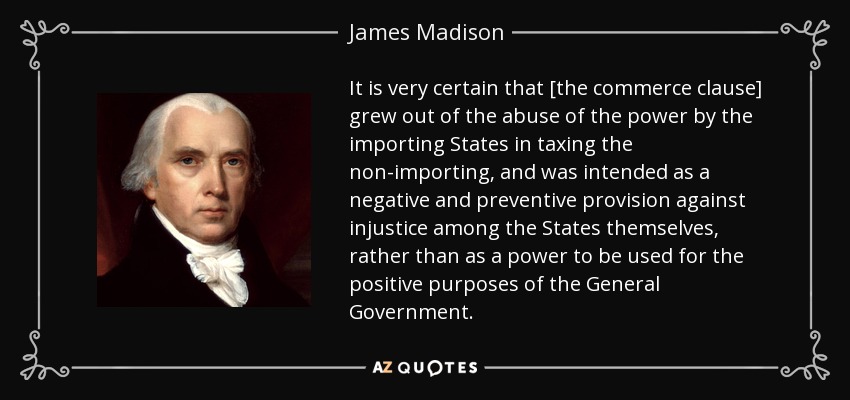Why is the federal government not challenging the authority of the states to set rules with respect to the conduct of business during The Contagion? It seems to be a given that governors (on down) have the authority to say who can be open, who can't. Who can go to work, who can't. Who can leave their homes to buy things, who can't. Even Donald Trump, the latest in a long line of presidents most vividly illustrated by the last one we had, who thinks that there is no meaningful limit on what the federal government can do, finds himself in the position of "urging" state governors to accelerate reopening.
It may come as a surprise to some, but the U.S. Constitution actually sets forth the matters upon which "the Congress" may exercise power. Supposedly, that's it. However, over the centuries -- actually, over the last century-plus -- when faced with whether a particular Congressional assertion of authority in passing laws is before them, the Supreme Court has fastened on what is known as the Commerce Clause. It is found in Article I, Section 8, Clause 3, and it goes like this: Congress has the power
to regulate Commerce with foreign nations, and among the several States, and with the Indian Tribes.
I'll spare you the history and the nuances, but suffice it to say that the Supreme Court has read this phrase as authorizing any federal legislation that substantially affects interstate commerce. That, I'm sure you can surmise, covers a lot and a lot and a big lot of laws that you would never think rose to the specificity of "regulating" interstate commerce.
I'm not here to argue the wisdom of that interpretation or that many legislative sins have been forgiven in the name of that sweeping interpretation favoring Congressional authority. Only that that is the current state of Commerce Clause law, and it isn't going anywhere anytime soon.
James Madison's quote at the end of this essay to the contrary. Sorry, Jim.
So here's the question:
Let's assume, as seems to be the case, that there is a growing consensus in Washington (and everywhere that people breathe free, not to bias the discussion here) that a continuation of the shutdown, whatever its merits in mid-March, is -- when viewed with the best available science and numbers -- unjustifiable in late May and going forward; that the increased risk of infection and mortality is more than balanced by the need to get businesses open, get supply chains re-lubricated, get unemployment claims down, get life in general back to normal.
Again -- I'm not here to argue whether this calculation is justified, or moral, or a threat to the old folks. It is not my intention to gig the no-economic-price-too-high-to-save-lives crowd. I only want to consider who has the authority to act.
Go back and read that text of the Commerce Clause, and bear in mind that it is beyond current question that it authorizes any law that "substantially affects" interstate commerce, which is essentially all commerce of any noticeable economic substance.
You do not have to stretch that interpretation to see that it would plainly authorize a statute that entirely leapfrogged governors, mayors, and any other non-federal authority to require, or at least not issue orders against, reopening. No, not even the Ninth Circuit, not even Laurence Tribe, would conclude that a federal enactment specifically aimed at attempting to reverse the slagging of the entire American economy would "regulate commerce among the several states."
I don't know what exact shape that legislation would take. Me, I'd add some filigree to it, like a tort-reform provision protecting employers and businesses from reopening-related liability, and I'd make it retroactive to the beginning of The Contagion. I might build in some permissive local authority to let the local pols have some flexibility to look like they're doing something useful. But what the law should not tolerate is gubernatorial fiat visiting further destruction on state economies.
The Tenth Amendment, sometimes urged as a hedge against federal overreaching, is not helpful to the governors here. It provides:
The powers not delegated to the United States by the Constitution, nor prohibited by it to the states, are reserved to the states respectively, or to the people.
Doesn't work here, because the Commerce Clause describes "powers delegated to the United States by the Constitution."
If properly-tailored legislation -- that is to say, legislation that didn't have some kind of prohibited secondary purpose or purport to overreach -- were introduced in Congress aimed at ameliorating the damage to the U.S. economy caused by the reaction to the coronavirus threat, no court could declare it unconstitutional without entirely upending decades of Commerce Clause interpretation.
Which, come to think of it, would not be such a bad idea.
So it's a win-win.
* * *
NOTE: Now that we know the shocking economic damage done by the state-by-state shutdown orders, I suggest that the foregoing analysis would also give Congress the authority to occupy the entire subject-matter area of the conduct of economic activity during times of contagion, giving it authority to override state authority to order shutdowns in the first place. This gets into things like the "dormant commerce clause," the ability of states to legislate in the absence of congressional intent to preempt an entire area of legislation, and other technical issues I do not propose to discuss here.
[PS: I have put aside whether any legislation proposed by this administration, irrespective of its merits, could pass the House at this time. Its mere introduction would separate those who favor the continued constraints on freedom for opportunistic and/or "scientific" reasons, from those who favor starting to bake the risks of infection and death into the economic system, as all human activities involving risk (i.e., all human activities) already have been.
Don't get me started on executive orders.]

CoolHotCenter@gmail.com
@CoolHotCenter
Please share this post with interested persons.